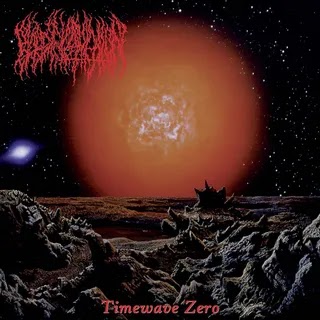The Denver death-metal quartet’s wordless, old-school, analog synth music flips the genre’s atmospheric interstitials into towering showstoppers that invite deep concentration.
Last weekend, the members of Blood Incantation performed at Denver’s Gothic Theater, where they stood motionless behind racks of synthesizers on a stage lit by candles and decorated with a few carefully placed orbs and obelisks. The only guitar in sight was an acoustic, tucked away in the corner. The very setup meant that, even if they wanted to (say, for a surprise encore), the Colorado death-metal quartet would not be performing any recognizable version of the music that first won them an audience—initially in the metal underground, and then, with 2019’s breakthrough sophomore album Hidden History of the Human Race, far beyond its borders.
In place of those explosive, riff-heavy epics, Blood Incantation used this one-off show to debut Timewave Zero, a stormy and muted new ambient project. The way that guitarist and vocalist Paul Riedl describes it, he and his bandmates charted this trajectory as early as their first rehearsal. Back then, they decided their signature sound would be a cosmic blend of death metal chestnuts (Death, Morbid Angel, Gorguts); their sophomore album would veer toward psychedelic, neon green landscapes; and their third would consist entirely of ambient music, focusing on a single element of their work.
In the context of their discography, Timewave Zero isn’t exactly a radical shift. More than the soothing, mystical new age they shout out in interviews (Reidl remains death metal’s most dedicated Enya fan), the atmosphere recalls a period in the early 1970s when progressive rock bands started incorporating synthesizers, using the era’s state-of-the-art equipment to push beyond the standard textures of rock music. These artists, who aspired toward the intricate compositions and sweeping movements of classical music, had high ambitions, and so do Blood Incantation, even if, half a century later, those same sounds might scan as more vintage than visionary.
It will likely only take a few minutes into Timewave Zero before you decide whether or not you need it in your collection. To some, these longform compositions might feel interesting only in theory: a cerebral exercise to cross off the to-do list before pure inspiration strikes again. And yet, like all of their music, Timewave Zero rewards an open mind and close listening, rising above gearhead hero worship into daring, unexpected places. “To contact Blood Incantation, CONCENTRATE,” reads a message included with each of their albums. More than anything they’ve attempted before, this wordless, old-school, analog synth music recasts that instruction as an open invitation.
The most immediate aspects of Timewave Zero are the groovy, pulsing melodies lurking in the depths of both compositions—the first titled “Io,” the second “Ea.” Both pieces take a similar journey through four movements and roughly 20 minutes. They both begin with a low, wind-chiming rumble, which evolves into a laser-show crescendo before hushing back to a burbling roar. At their peak in the second movements, both songs spotlight a cycle of notes on the synthesizer—motifs that, if transposed for a down-tuned electric guitar, you might call “riffs”—that make Timewave Zero more distinctive and intense than the planetarium mood music Reidl has occasionally described it as.
In both compositions, the most compelling parts are the in-between phases, which just so happen to be in the third movements. This is when Morris Kolontyrsky enters with acoustic guitar, a pacifying texture amid the dark swirl of synths. The third movement of “Ea,” in particular, makes brilliant use of these dynamics. Kolontyrsky fingerpicks a minor chord over what sounds like a Mellotron, building to a mournful swell that suggests the shadow of a string section. It comprises the most beautiful five minutes on any Blood Incantation record and recalls the pastoral opulence of early King Crimson—the quiet moments that helped amplify the devilish outbursts surrounding them.
Building from those early prog records, the use of momentary ambience as the calm before the storm has long been foundational in metal. From Tony Iommi’s classical guitar pieces in Black Sabbath to Chuck Schuldiner’s spacey interludes in Death, it’s a way of snapping the audience back to attention, making the hard stuff hit harder and shading in the spooky outskirts of a band’s sound. In some ways, Timewave Zero is a loving tribute to this particular aspect of metal, repositioning those ominous, interstitial pieces as towering showstoppers and highlighting innovators like Tangerine Dream as crucial influences as opposed to outlying figureheads.
At the same time, the record itself can feel like a kind of interlude: a well-earned breather before the next full-on attack. Reidl has confirmed the band’s follow-up will be a return to metal, more subtly incorporating these songs’ lessons in composition and restraint (as well as those learned from Reidl’s ambient solo albums, both under his own name and as Hoverkraft). Listening to Timewave Zero, you can sense the band proudly embracing its transitional nature, rarely attempting to push beyond its self-imposed boundaries—a triumph by existence alone, an itch they had to scratch. And if it’s not necessarily the music that Blood Incantation will be remembered for, it is precisely the kind of risk that shows why they’ll be remembered.



0 comments:
Post a Comment